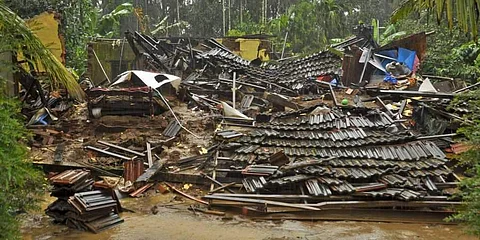

In the context of the repetitive disastrous situation prevailing in Kerala, the entire world is shocked and searching for the reasons behind it. As the traditional seasonal calendars are changing and floods and landslides are slowly becoming a part of the new calendar, it is time that we take a look at the reasons and measures that could be taken to mitigate the same. Ecologist Madhav Gadgil who chaired Western Ghats Ecology Expert Panel (WGEEP), which came up with the most appalling report on the environmental realities that our eco-rich areas are facing, claims that the Kerala disasters are also manmade. The Western Ghats which stretches from Kanyakumari to the banks of Tapti and almost covers the 75 per cent length of the total land area of Kerala is one of the world’s eight most important biodiversity ‘hottest hotspots’ as recognised by UNESCO. This is a hub of various freshwater sources, mangroves, other unique ecosystems, different range of species which includes those species which face endangerment. This zone is also a primary livelihood source for almost 29 tribal and forest depended communities.
The Gadgil report, through various grass-root level discussions and research, marked this spot as an Ecological Sensitive Zone. Over-mining, industrialisation, electricity generation projects and tourism continued to disturb the vulnerable hill ranges. These hot zones are categorized as three in the report as ESZ 1, ESZ 2, ESZ 3 in which the first category is the most vulnerable area. The report was not particularly welcoming for the existing systems. The report was considered ‘too ecological’ for the public and the governments. The cautions alarmed in the report were mostly ignored. Explicit fluctuation in temperature, humidity, rainfall, and direction of the wind in Kerala should also be considered at a global scenario for climate change.
As suggested in the report, the mitigation measures should come from the grass-root level. Being the real owners of the land, it is the indigenous and innate communities who have the in-depth knowledge in their resources and geography and it is only people from these communities who could play the role of the guardians of the area. Grama Sabhas and Ward Sabhas being the primary platform for the public and the base of Indian democracy, has a vital role in the protection of the Western Ghats. In the context of back to back natural disasters, Kerala has formed a new working group in all the local governments for biodiversity management, climate change, environmental protection, and disaster management.
Spreading awareness among the public on the current scenario of climate change and the role and powers of the Grama Sabha in decision making is an inevitable step in front of our governments for rebuilding a Nava Kerala. Even though Kerala excels in its local government system, participation in the Grama Sabha is still poor. Strengthening of Grama Sabha, the new working group and existing Biodiversity Management Committee (BMC) will empower the local governments in making better annual plans and mitigating the ongoing exploitation happening in their localities. It is also the responsibility of the policymakers and above-mentioned groups to make sure that the livelihood of the people isn’t badly affected by following the sustainable modes of production and strictly regulate/prohibit the exploitation taking place. The media must also give more focus to the local governments, their sustainable developmental activities, and projects. The concept of sustainable development could only be made successful from a well-decentralised structure and power and voices coming from the people.
